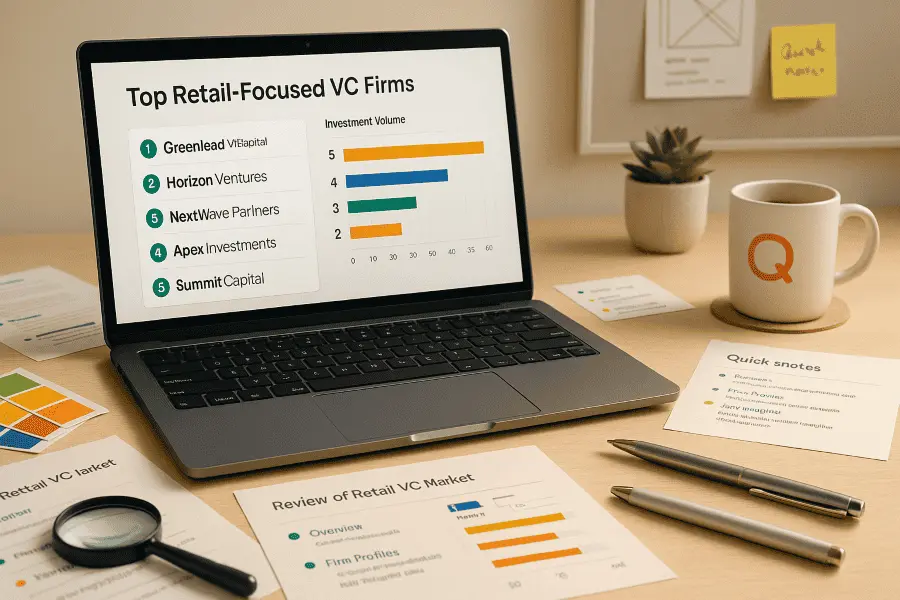Retail is massive. Global retail sales was projected to reach $31.1 trillion in 2024. When a market is that big, even small improvements in shopping, logistics, and margins can create outsized wins.
That is why venture capital keeps showing up in retail. Global VC investment reached $368.3 billion across 35,684 deals in 2024. This rebound signals renewed appetite for scalable startups, including retail brands and retail tech companies.
This blog highlights the top venture capital firms driving retail innovation and explains what they look for. You will also get practical tips to improve your chances of getting funded.
Let’s get started!
Retail VC Investors: Market Dynamics and Funding Trends
Venture capital in retail is evolving rapidly, shaped by sector performance, geographic patterns, and macroeconomic pressures.
Recent Deal Activity
Rezolve AI's recent $50 million raise, led by Citadel Global Equities, illustrates investor appetite for AI-enabled retail platforms. The funding propelled Rezolve AI to $70 million in Annual Recurring Revenue (ARR) and secured a $10 million annual contract with UK retailer Liverpool FC. This deal exemplifies how retail tech, particularly AI-powered customer experiences, inventory optimization, and omnichannel solutions—continues attracting substantial capital.
Geographic Funding Patterns
Early-stage deal concentration varies dramatically by region. During 2023-2024, over 80% of deals in Central Asia and the Caucasus were pre-seed or seed rounds, compared to 50-60% in the US and Europe. This disparity reflects both emerging market dynamics and the maturity of established venture ecosystems. Founders in nascent markets may find more competition for seed capital but less saturation at later stages.
Sector-Specific Headwinds
Not all retail subsectors are thriving equally. Retail FinTech funding dropped 37.8% in Q1 2025, pressured by tariffs, inflation, and reduced investor confidence in payment processing and financing platforms. If your startup operates in this space, consider pivoting your pitch toward generalist VCs or repositioning into adjacent sectors like e-commerce infrastructure or embedded finance.
Outside FinTech, e-commerce and consumer packaged goods (CPG) startups continue attracting strong interest from seed and growth-stage investors. These categories benefit from proven business models and clearer paths to profitability. For more advanced strategies, see retail startup fundraising strategies.
Stage Distribution and Investor Strategy
Retail VCs typically deploy capital across the full funding lifecycle, from pre-seed through Series C and beyond. This staged approach allows founders to secure appropriate partners as they scale, while enabling firms to diversify risk and capture upside across company maturity levels. Understanding where a VC focuses (early traction vs. growth capital) helps you target the right firms for your current stage.
For insights on how private equity complements venture capital in retail, see our guide to top retail PE firm investors.
What Leading Retail-Focused Venture Capital Firms Do Differently
Top-tier retail VCs separate themselves through three core advantages: technology-driven deal sourcing, deep sector networks, and rigorous investment discipline. These capabilities translate directly into superior portfolio outcomes and faster pattern recognition in emerging retail trends.
AI-Powered Deal Sourcing and Portfolio Intelligence
Leading firms have industrialized their investment process using artificial intelligence. Nearly 64% of venture capital firms now deploy AI tools for deal discovery and portfolio monitoring, but the best retail VCs go further—they've built proprietary systems tailored to retail-specific signals.
Specialized Tools Driving Retail VC Workflows:
- Caena automates deal filtering by investment thesis, screening hundreds of inbound pitches against firm-specific criteria (customer segment, business model, unit economics thresholds). This lets partners focus on qualified opportunities rather than manual triage.
- TechScout and Quid map emerging technology clusters and competitive landscapes, helping retail VCs identify white space opportunities before they become crowded.
- Eilla AI provides research support across 8+ million companies, pulling data from sources like Capital IQ to accelerate due diligence and competitive analysis.
These platforms don't just save time—they surface non-obvious patterns. AI can detect early signals of product-market fit, identify founder-market fit indicators, or flag operational red flags that human reviewers might miss across hundreds of deals.
Market Context: The AI Investment Surge
Private AI investment hit $252.3 billion in 2024, driven largely by generative AI adoption. This capital influx reflects investor conviction that AI will reshape industries, including retail, at the infrastructure and application layers. Top retail VCs are both deploying AI internally and funding AI-enabled retail startups, creating a feedback loop of capability and insight.
Real-World Application: Ankar's $20M Series A
Theory meets practice in deals like Ankar's recent $20 million Series A. The company is using AI to modernize patent management, a legacy process plagued by inefficiency. VCs backed Ankar not just for the technology, but because AI-driven operational improvements in unsexy categories (legal ops, supply chain, back-office automation) represent massive TAM with fewer competitors. Leading retail VCs recognize that AI's highest ROI often lies in solving overlooked friction points, not just flashy consumer applications.
Strategic Networking for Commerce Tech VC
Building strong networks is key for successful VC firms. Founders often ask where to meet retail-focused investors. These networks help validate deals faster and connect startups with corporate partners and industry experts.
- Start with clear goals: Define which commerce-tech subsectors, geographies, and ticket sizes you want connections in; a focused target list yields warmer intros and higher-quality deal flow.
- Map relationship capital: Use a simple CRM (e.g., Affinity or Airtable) to log founders, execs, and co-investors, then set 30-day touch-points so each contact hears from you before the next round opens.
- Share, don’t hoard, deals: Circulate 1–2 vetted commerce-tech decks weekly to trusted syndicate partners; reciprocity expands scouting reach while preserving proprietary edge.
- Anchor on expertise hubs: Speak or mentor at Shopify, BigCommerce, or retail-tech accelerators; positioning as a niche expert attracts founders before competitive processes begin.
- Blend online & IRL: Post one insight thread per week on LinkedIn + X, then schedule coffee at flagship events (Shoptalk, NRF) to convert digital engagement into durable ties.
For example, corporate venture retail investments explains how corporate venture arms support retail financing. This approach speeds up decisions and helps startups reach product-market fit.
Focused Portfolio Support for Brand-Focused Venture Capital
Leading firms now focus on high-quality opportunities instead of spreading resources thin. AI analytics guide this selectivity. Firms can then give more attention to their portfolio companies.
By concentrating capital and operational resources on a smaller, data-validated set of companies, brand-focused VCs can deploy deep-dive playbooks, covering growth marketing, distribution partnerships, and strategic hiring, that simply aren’t feasible with a scatter-shot portfolio.
How Accelerators and Angel Networks Support Retail Startups
Building on the strategies of leading VC firms, retail accelerators and angel investor networks provide vital early-stage support. These organizations offer mentorship, industry connections, and initial capital to help startups refine their business models. Early engagement with accelerators and angels can increase a startup’s credibility and readiness for later venture rounds. This approach creates a strong foundation for long-term growth and successful VC partnerships.
Best Practices for Targeting Retail Venture Capital
- Research VC firms to ensure their investment stage matches your startup’s current funding needs and growth trajectory.
- Target investors with demonstrated expertise in your specific retail sub-sector for better alignment and support.
- Consider geographic presence and market focus to increase the likelihood of strategic fit and ongoing engagement.
- Tailor your pitch to highlight how your business aligns with the VC’s portfolio and investment thesis.
Platforms for Investor Discovery and Deal Sourcing
Top 7 Retail Venture Capital Firms
Here are the seven most active VC firms in retail startups from June 2024 to May 2025. They are ranked by deal count:
- Forerunner Ventures (36 investments)
Forerunner backs e-commerce, retail, and healthcare companies at Seed to Series B stages. They invest across the US, Canada, and Israel. - FJ Labs (36 investments)
FJ Labs invests in marketplaces and consumer startups from Seed to Series B. They support teams in the United States, Brazil, and the United Kingdom. - Global Founders Capital (29 investments)
GFC has backed over 500 founders worldwide. They invest in financial services, software, and fintech at Pre-Seed to Series A stages in the US, Germany, and the UK. - Accel (23 investments)
Accel targets software, SaaS, and IT companies at Series A to C. They invest in the US, India, and the UK. - SOSV (21 investments)
SOSV runs deep-tech accelerators like HAX and IndieBio. They fund biotech, health-tech, and software startups in the US, India, and the UK. - Index Ventures (20 investments)
Index Ventures has offices in London and San Francisco. They back tech-enabled e-commerce and internet startups from Seed to Series B. Their focus includes fintech, AI infrastructure, and mobility in the US, UK, and France. - District Ventures Capital (20 investments)
District Ventures, led by Arlene Dickinson, invests in Pre-Seed and Seed food, beverage, manufacturing, and retail startups in Canada and the US.
These firms offer deep retail expertise and strong networks. They are top partners for startups aiming to scale in consumer markets. If you seek VCs focused on e-commerce and retail, this list shows the range of specialization available.
Conclusion
Securing funding in retail, fintech, SaaS, and healthcare requires a tailored strategy. Each industry has unique dynamics. This blog shared actionable strategies for startups. Retail startups should align their pitch with data-driven storytelling. This approach increases appeal to venture capitalists.
If you’re looking to turn retail dynamics into investor conviction, at Qubit we understand merchandising calendars, SKU economics, and seasonal cash cycles. Sharpen your story with our retail fundraising assistance and line up the right investor meetings.
Key Takeaways
- Top retail VC firms focus on selectivity and network-driven deal sourcing.
- Strong retail tech funding and strategic investments in SaaS and healthcare show market confidence.
- Macroeconomic challenges affect retail FinTech funding, so adaptive strategies are needed.
- AI and analytics are changing investment decision-making.
- Relationship intelligence tools boost dealmaking and investor outreach.
- Data-driven storytelling in pitches increases startup appeal to investors.
Frequently asked Questions
What trends are shaping retail venture capital in 2025?
Retail venture capital in 2025 is influenced by AI, relationship intelligence tools, and market confidence in SaaS and healthcare. Startups need adaptive strategies for these trends.






